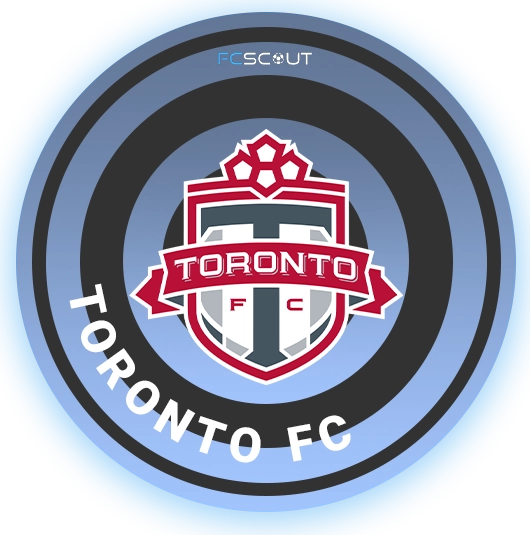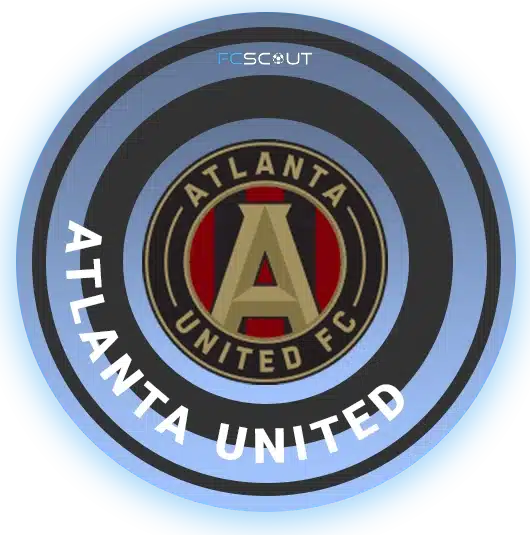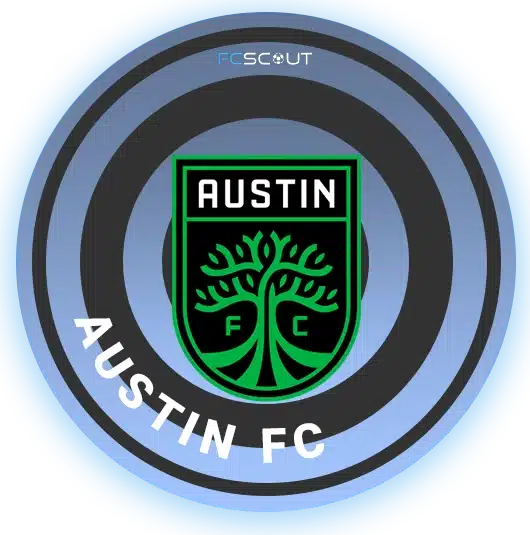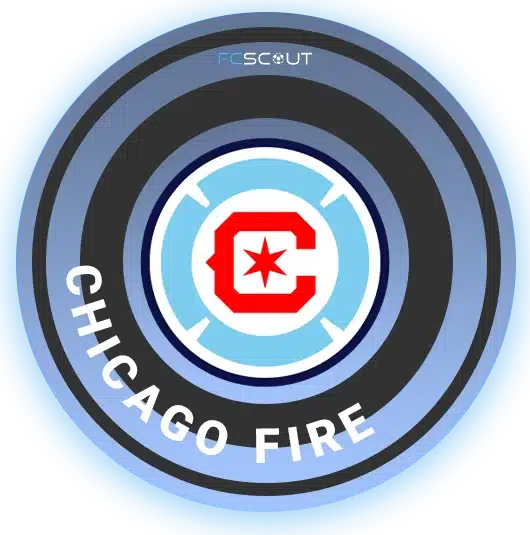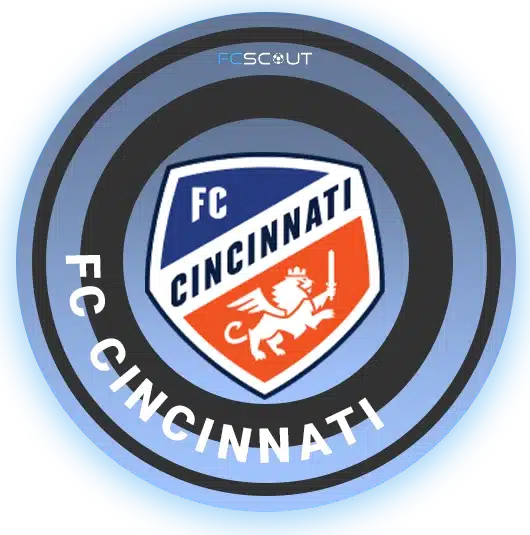TORONTO FC CLUB GUIDE
History, Stadium, Players, and More!
Discover the world of soccer with fcscout.com, your go-to scout for club tryout information, club guides, player profiles, in-depth product reviews, and more.
1000+
team reviews of trending clubs
2M+
active users
annually
1000+
profiles in our player database
Explore
Toronto FC
Toronto Football Club is a Canadian professional soccer club based in Toronto, Canada. The club competes in Major League Soccer (MLS) as a member of the Eastern Conference.
Toronto FC History
Toronto FC is a professional soccer club based in Toronto, Ontario, Canada. Since its establishment in 2006, the club has grown to become one of the most prominent teams in Major League Soccer (MLS). Here’s a comprehensive summary of Toronto FC’s history from its inception to the latest developments known:
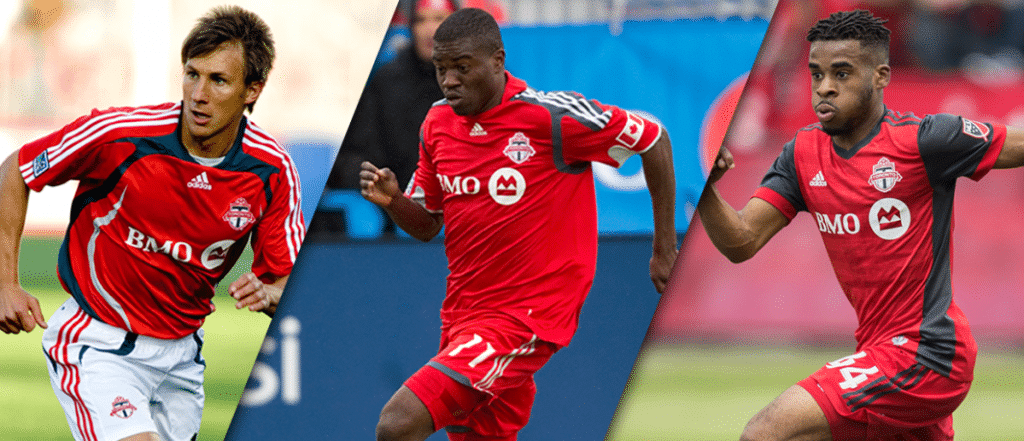
Foundation and Early Years (2006-2009): Toronto FC was announced as Major League Soccer’s 13th franchise in 2005, beginning play in 2007. The team’s early years were challenging, with the club struggling to make a significant impact on the field. Despite these struggles, Toronto FC quickly developed a passionate fan base, particularly known for the vibrant atmosphere created by supporters in the “Red Patch Boys” section. In these foundational years, the club focused on building its identity and establishing a solid foundation for the future.
Building Momentum (2010-2014): In the following years, Toronto FC began to build a competitive team, investing in new players and improving its infrastructure. The club made notable signings, such as Dwayne De Rosario and Julian de Guzman, aiming to enhance team performance and make its first playoff appearance. Despite these efforts, success was not immediate, and the team faced several seasons of disappointment. However, the commitment to improvement was evident, and the foundation for future success was being laid during this period.

Era of Transformation (2015-2016): A significant turning point for Toronto FC came in 2015 when the club made substantial investments in high-profile players like Sebastian Giovinco, Michael Bradley, and Jozy Altidore. This era marked the beginning of Toronto FC’s transformation into a dominant force in MLS. The club made its first playoff appearance in 2015 and quickly emerged as a top contender in the league, signaling the start of a new, more successful chapter in its history.
Historic Achievements (2017-2018): The 2017 season was a landmark year for Toronto FC as the team achieved an unprecedented treble, winning the MLS Cup, the Supporters’ Shield, and the Canadian Championship. Under the leadership of coach Greg Vanney, the team showcased remarkable performance throughout the season, culminating in their MLS Cup victory, the first in the club’s history. The following year, Toronto FC continued to perform well, although they were unable to replicate the previous year’s success. However, they remained competitive and solidified their status as one of the league’s elite clubs.
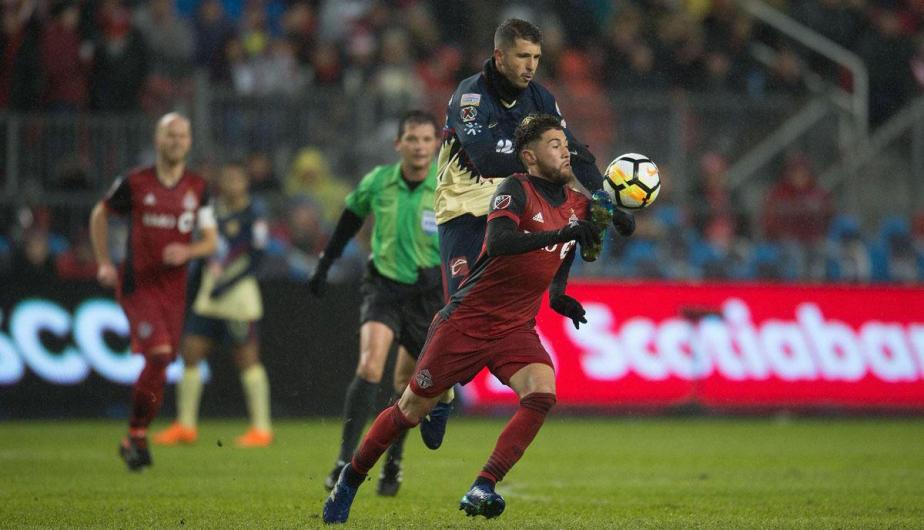
Challenges and Resilience (2019-2021): Following their historic achievements, Toronto FC faced a period of challenges, including key player departures and injuries. Despite these setbacks, the team demonstrated resilience, reaching the MLS Cup final again in 2019 but falling short against the Seattle Sounders. The subsequent seasons were marked by transition and rebuilding, as the club aimed to return to its former glory while navigating the difficulties posed by the COVID-19 pandemic and changes in management and roster.
Recent Developments and Future Outlook (2022-Present): In the most recent seasons, Toronto FC has been focused on rebuilding and returning to the forefront of MLS competition. The club has made strategic signings and invested in youth development, aiming to blend experienced players with young talent. The appointment of new management and coaching staff signals a fresh start and a commitment to achieving success both domestically and in international competitions. As Toronto FC continues to evolve, the club remains dedicated to its passionate fan base and to maintaining its status as a flagship franchise in Major League Soccer.
This summary brings us up to the known developments as of late 2023. Toronto FC’s journey from a struggling expansion team to a model of success in MLS illustrates the club’s resilience and ambition. With a focus on sustained growth and performance, the future looks bright for Toronto FC as it aims to add more chapters to its already rich history.
Toronto FC Youth Development System
Toronto FC Academy Overview
TFC Academy is the youth academy and development system of Toronto FC that was established in 2008. The academy consists of multiple teams spanning different age groups from U12 to U20. Starting 2020, the senior academy squad (known as Toronto FC III) plays in the MLS Next.
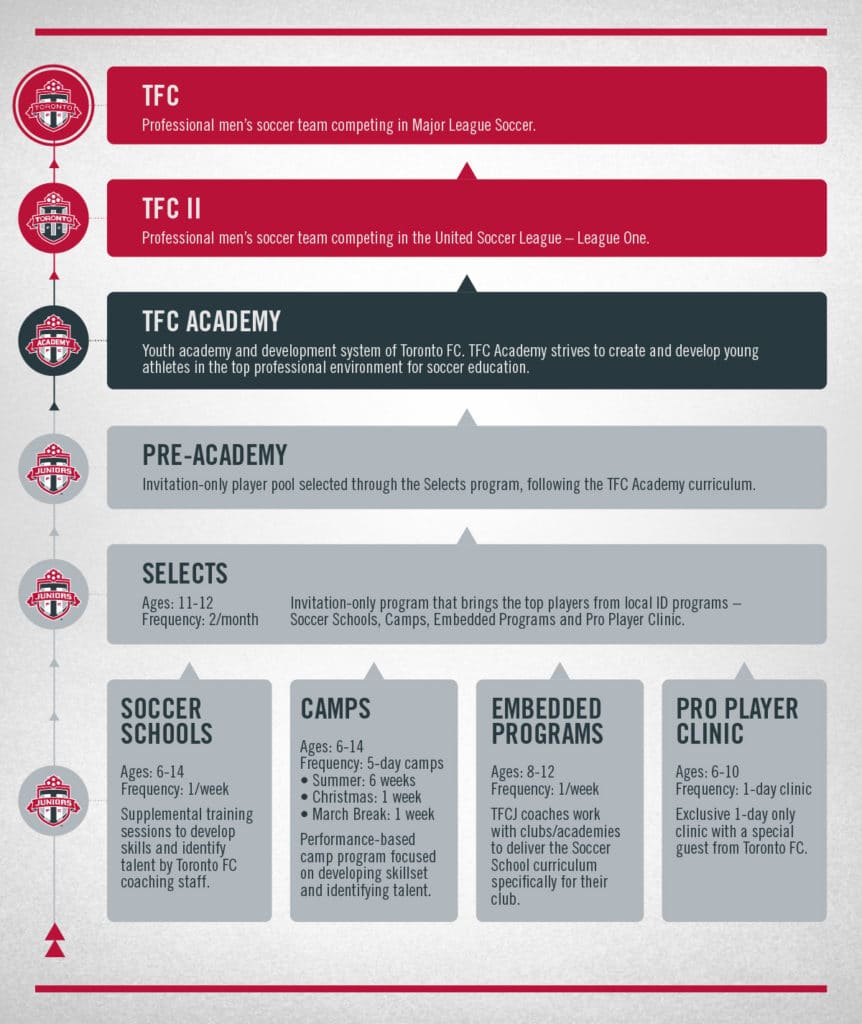
In June 2012, TFC academy moved to their new practice facility originally named Kia Training Ground, but subsequently renamed BMO Training Ground as the former’s naming rights expired at the end of 2017, located in Downsview Park in North York. Built at a cost of $21 million to MLSE, the facility has seven pitches: three full-sized grass pitches and four artificial turfs with two capable of being bubbled for year-round use. The 36,000-square-foot (3,300 m2) facility also contains first team facilities, gym, kitchen, and offices.
Toronto FC Academy
HISTORY, FACILITIES AND ENVIRONMENT
- At TFCA, our goal is to create the best professional environment for soccer education in North America, which is evident not only in the facilities, but the opportunity of our athletes to interact with our first team players on a regular basis in the halls of the Training Ground
- Toronto FC was founded in 2007, becoming the first Canadian team to compete in Major League Soccer. The Toronto FC Academy was launched in 2008, creating a blueprint for professional player development within Canada
- The Training Ground was built in 2012 for $23 million. It is an all-purpose, state of the art 40,000 square foot training facility with four full-sized grass fields and four synthetic turf fields, two of which, can be converted for indoor play during the winter months. Field maintenance is handled by Robert Heggie, who was named North American Sports Turf Manager of the Year in 2015
- 8 team locker rooms (5 with wet areas)
- 4 coaches’ locker rooms (3 with wet areas)
- 2,810 square foot two story gym
- Dining Room – fully staffed kitchen
- Classroom
- Amphitheatre
- Medical rooms (one allocated to the First Team and one to the Academy)
- High Performance room
- First Team lounge
- Academy lounge
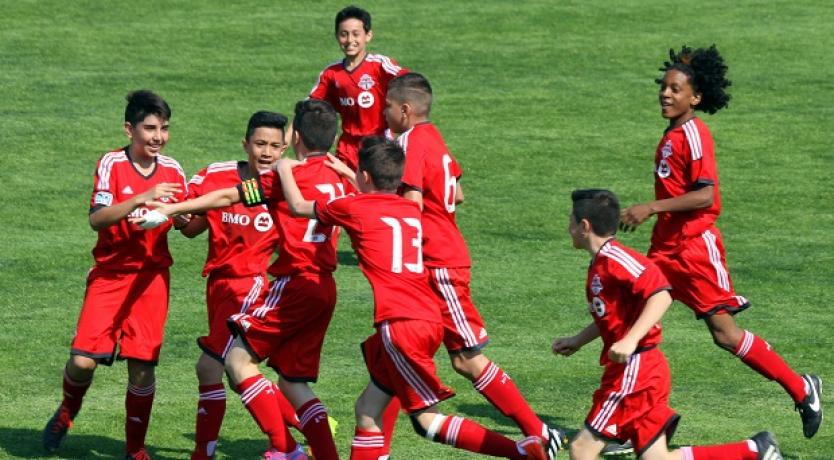
Toronto FC PLAYER DEVELOPMENT
- Toronto FC Academy began in 2008 with two teams in the U-16 and U-18 brackets and now has a full player pathway from U-12 to U-20, Toronto FC II and the First Team (see player pathway here)
- Toronto FC Academy has over 150 athletes
- Toronto FC has a partnership with the Ontario Soccer Association which recognizes Toronto FC’s pathway as the elite pathway in Ontario for aspiring professionals. The partnership is centered around building grassroots soccer and player identification
- In 2014 Toronto FC acquired their own USL franchise (Toronto FC II) and acts as a stepping stone between Toronto FC Academy and the First Team
- The Toronto FC Academy identifies talented players from all over Ontario (GTA, Ottawa, Kitchener-Waterloo, Barrie) and North America, with certain players being placed into residency with local families*
Toronto FC STAFF AND SERVICES
- One full-time Academy Director, six full-time coaches and four part-time coaches
- Full service Medical Department overseen by the First Team Director of Sport Science, with two full-time Athletic Therapists, dedicated to treating the Academy athletes
- Full service Equipment Department overseen by the Manager of Equipment Operations, with one full-time staff member solely responsible for the Academy equipment
Toronto FC EDUCATION DEPARTMENT
- The Academy has a Manager of Education whose sole responsibility is to help athletes achieve academic excellence and broaden their future options (soccer, school)
- Services provided to our athletes include:
- NCAA information seminars
- SAT diagnostic test and prep course
- Tutoring sessions
- Co-op course programming, created by Toronto FC and hosted at The Training Ground
- Academic timetabling support, which allows athletes flexibility in their schedule and a more manageable lifestyle
- Toronto FC Academy holds an annual College Showcase for our high school athletes where the best college coaches in Canada and the U.S. come to the Training Ground to scout our athletes (Toronto FC College Showcase – May)
- Academy athletes have enrolled/graduated/earned scholarships at the following schools: Manhattan College, University of Toronto, St. John’s University, Ryerson University, Duke University, Florida Gulf Coast University, Coastal California University, Drake University, Syracuse University, York University, UC Santa Barbara, Grand Canyon University, Pittsburgh University, Oregon State, Michigan State, Sheridan College, University of Maryland
Toronto FC SOCCER CURRICULUM
- Toronto FC has a specific club curriculum, which outlines the club’s unique coaching methodology and pedagogy, that is utilized for all Academy teams, Toronto FC II and the First Team
- Our High Performance Department targets our high potential athletes and provides a curriculum, on top of their soccer, to help our athletes reach their full potential, whether that level is collegiate, USL, MLS or in Europe
- Each athlete in the Academy has an Individualized Development Plan (IDP) that evaluates and scores each player in the eight areas of Toronto FC’s holistic player evaluation methodology (click here for 8 areas)
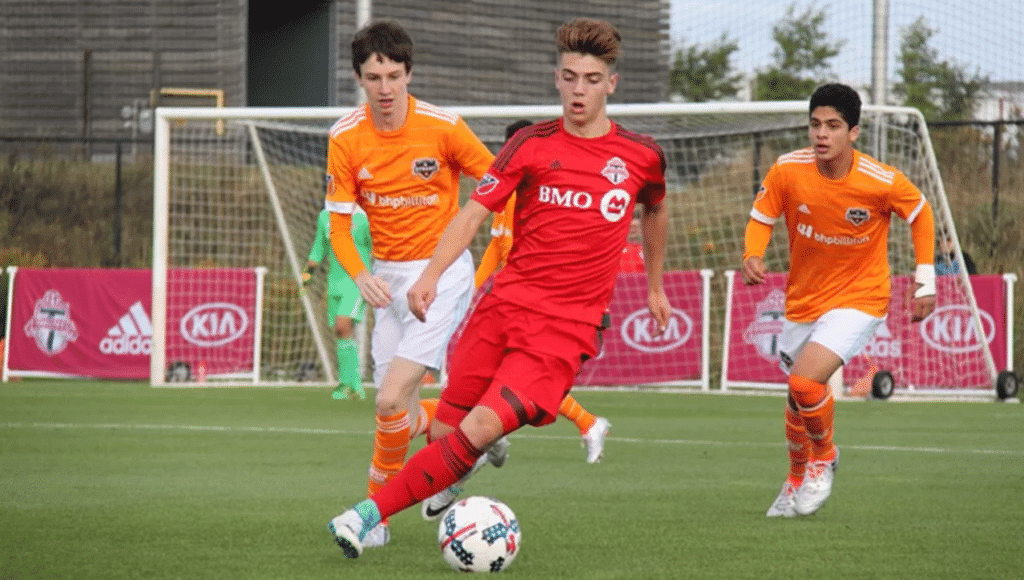
Toronto FC COMPETITION
- The competition structure for the Toronto FC Academy is a blend of the following:
- The best local competition in Ontario [League 1, Ontario Soccer League (OSL), Ontario Youth Soccer League (OSYL), Ontario Player Development League (OPDL), York Region Soccer League (YRSA)]
- The highest level of competition in the United States [Generation adidas Cup*, US Soccer Development Academy (USSDA) Showcases, Dallas Cup, etc.]
- Top rated tournaments all over the world (Italy, Spain, France, Croatia, Qatar, South Africa, Mexico)
- All Academy teams participate in International competition on an annual basis
- Toronto FC II competes in the United Soccer League (USL), which is a professional men’s soccer league in the United States and Canada.
- Generation adidas Cup: Every year Toronto FC Academy competes in MLS’ Generation adidas Cup (GA Cup). The GA Cup is a U-17 tournament, in which all MLS clubs in the US (and Toronto FC) compete. The tournament format involves MLS clubs divided into three conferences (Western, Central and Eastern); each group participates in two regional events (the first is over Thanksgiving weekend in October, and the second is over Family Day weekend in February). The top two MLS clubs from each group moves on to the Champion Division in the GA Cup final, which is hosted over Easter weekend. Top International teams from all over the world are invited in to compete against the top MLS clubs as part of the Champions Division. In 2016, the following teams competed against the top MLS clubs, including our own TFCA team – Valencia, Mexico U-17, River Plate, Aspire Academy, Universidad de Chile, Villarreal.
Toronto FC ACADEMY ACHIEVEMENTS
- Toronto FC Academy U-17 teams have qualified for the Champions Division of the Generation adidas Cup, since the division’s inception in 2013
- Toronto FC Academy U-12 teams have competed in the elite U-12 division of the GA Cup since its inception (2015 – 1st place and 2016 – 6th place)
- Toronto FC consistently has the highest number of athletes called up to represent Canada (during International games and camps) at all age groups
Toronto FC HEALTH, NUTRITION & COGNITION
- Toronto FC is the only club in MLS that has a High Performance Department which focuses on the cognitive development of all athletes (First Team, TFC II, Academy athletes (U-10 to U-20)
- Academy athletes undergo concussion baseline testing at the beginning of each season through our partnership with Holland Bloorview Hospital, the first partnership of its kind in MLS
- Academy therapists work in collaboration with the full-time kitchen staff to ensure Academy meals at Training Ground and offsite (during tournaments), meet the nutrition requirements of young athletes
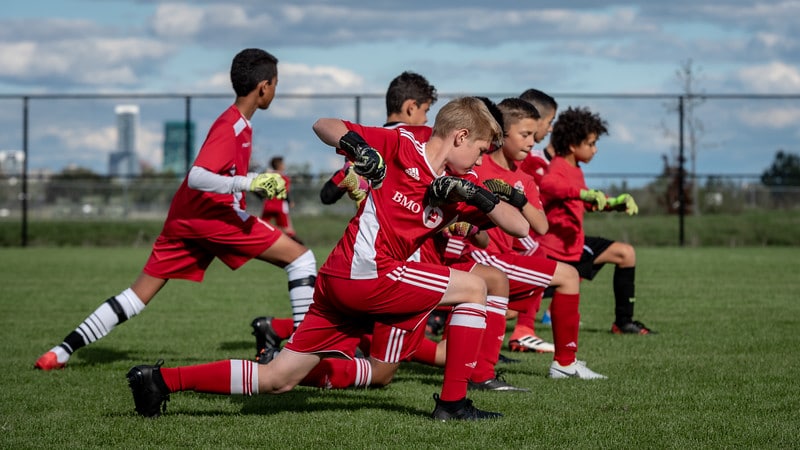
Toronto FC YOUNG PROFESSIONALS PROGRAM (“YPP”)
- Toronto FC Academy has a unique program designed for athletes who have been identified as a top talent within the Academy or who are currently on the TFC II team
- The program is a collaborative effort between coaches, the Director of High Performance and the Director of Sport Science
- Athletes are put in optimal learning environments with the objective of improving their neurological skills and decision making on the field
- Advanced technology is used in the process of monitoring their neurological development
- Athletes are also taught skills that are imperative to the life of a professional athlete (public speaking, social media, on camera interviews etc.)
Toronto FC FREE TO PLAY
- The Toronto FC Academy is 100% free to play
- Through Toronto FC Academy’s sponsorship with Adidas, all athletes’ equipment needs (cleats, jerseys, goalie gloves) are supplied by adidas at no cost
- Academy athletes have access to a full cafeteria, at no cost, where they are served meals following training on a daily basis
- The club covers all costs related to the annual events pertaining to an athletes’ training:
- League registration costs
- International and domestic trips for tournaments and league play (accommodation, meals, flights, buses, travel insurance)
- Stipends available for athletes who need financial support to cover commute costs
- Opportunities to train abroad are available to certain identified athletes, organized and paid for by the club
Toronto FC Juniors
The Toronto FC Juniors, also known as the TFC Juniors, is part of the youth academy and development system of Toronto FC. The program holds camps regionally and has held camps in Toronto, Pickering, Vaughan, Stoney Creek in Hamilton, Oakville, and Markham. The Toronto FC Juniors program is one of Toronto FC Academy’s main sources for prospects alongside their network of scouts. It is a curriculum based program, facilitated by a professional coaching staff, specializing in grassroots development for players aged six to thirteen.
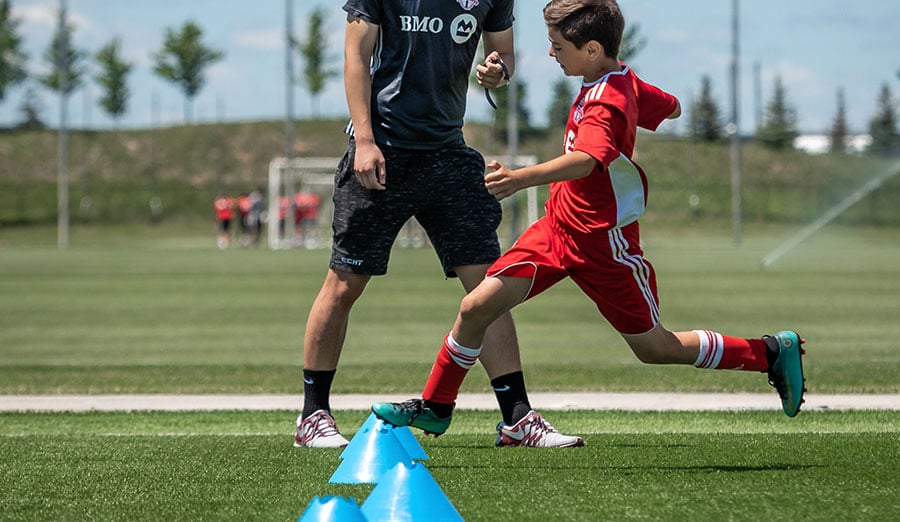
To register for Toronto FC Juniors, please click here.
To learn more about Toronto FC Juniors, please click here.
Toronto FC Juniors Soccer Schools
Looking for a program that offers additional training at a higher level of training for your young athlete? Our Soccer School program is for you!
Our Soccer School is a supplemental training program that is open to all male and female players aged six to thirteen years old. This program is built to support the training that players receive at their clubs and academies and not intended to replace club/academy programming.
Our coaches follow the Me-We-Us curriculum that is specifically designed to increase technical fluidity in players, increase spatial awareness and attach more purposeful decision-making to the three critical soccer moments of 1v1, overloads and collective play.
It is our goal to create the best foundation for development by igniting a spark in every player that enables them to want to play more soccer, watch more soccer, and be better players.
| Seasons: | Fall, Winter and Summer |
| Session Length: | 60-75 Minutes |
| Sessions/Wk: | 1 Session per week in each of our 6 regional training centre |
| Age Range: | Girls and Boys aged six to fourteen |
| Locations: | Burlington, Mississauga, Downsview, Oshawa, Niagara, Bradford |
To register for the TCF Juniors Soccer School, please click here.
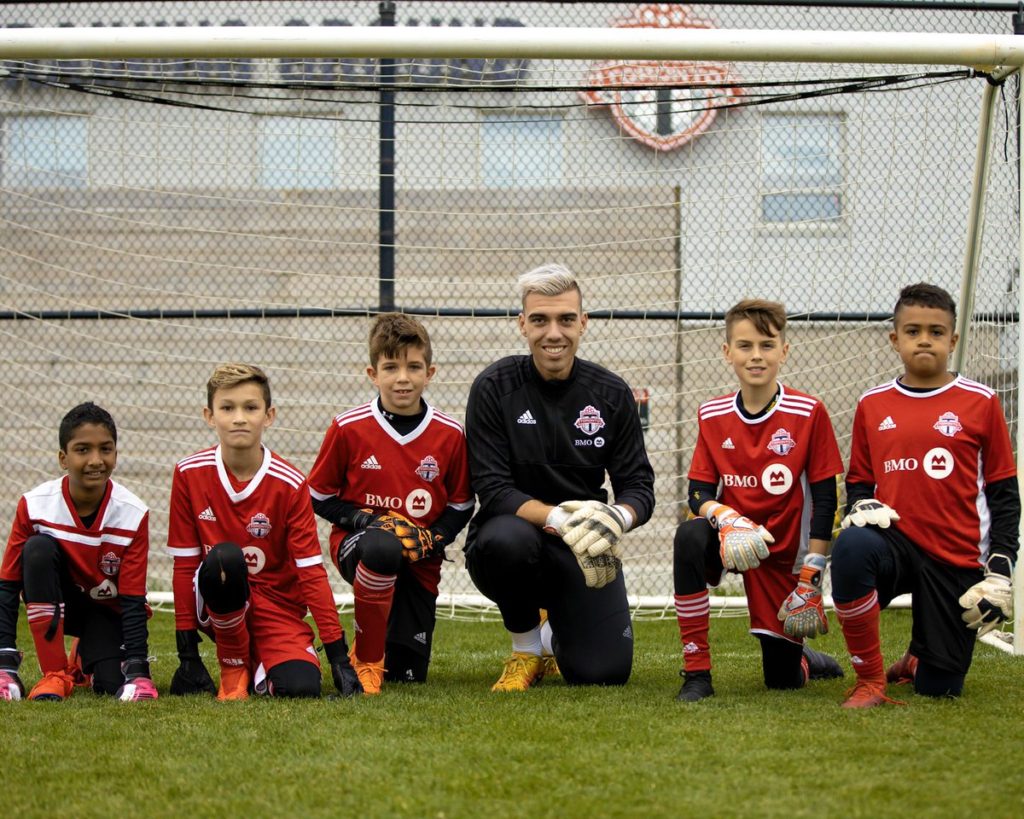
Toronto FC Juniors Camps
Looking for a performance-based camp for your child? We strive to make every player better, regardless of their playing level, for all players in the community. Our Camps program is performance-based focusing on a day full of soccer following the Me-We-Us curriculum designed to increase technical fluidity in players, increase spatial awareness and attach more purposeful decision-making to the three critical soccer movements of 1v1, overloads and collective play.
Our camps are full day from 9:00AM to 4:00PM with an early drop-off at 8:00AM and a late pick-up at 5:00PM, unless otherwise specified.
To learn more about the latest dates for camps, please click here.
Toronto FC Juniors Embedded Program
Is your team, club, or academy interested in having a TFC Junior coach run one session per week as part of your in-club training? We are committed to work with local clubs and academies to develop players using our Me-We-Us Grassroots Curriculum and prepare young athletes for the next step.
We work with clubs and academies to train both male and female athletes at the grassroot level, to increase technical fluidity in athletes, increase spatial awareness and attach more purposeful decision-making to the three critical movements of 1v1, overloads, and collective play. It is our goal to create the best foundation for development by igniting a spark in every player that enables them to want to play more soccer, watch more soccer, and be better players.
| DeRo United Year Round | Oshawa Civic Fields, 99 Thornton Rd S, Oshawa, ON L1J 5Y1 UOIT Field House, 80 Conlin Rd, Oshawa, ON L1G 7W1 |
| Markham Soccer Club October to May | Markham Sports Dome 5300 14th Ave, Markham, ON L3S 3K8 |
| Saltfleet Stoney Creek SC October to May | St Jean de Brebeuf Catholic Secondary School, 200 Acadia Dr, Hamilton, ON L8W 3K2 Cardinal Newman Catholic School, 127 Gray Rd, Stoney Creek, ON L8G 3V3 |
| Bolton Wanderers SC May to September | Edelweiss Park 320 Glasgow Rd, Caledon, ON L7C 3L9 |
| Brampton Youth SC May to September | Creditview Sandalwood Park 10530 Creditview Rd, Brampton, ON L7A 3G6 |
To learn more about TFC Juniors Embedded Program and to register, please click here.
Toronto FC Juniors Summer Select
Our Summer Selects is an invitation-only program where top players from our Soccer Schools, Camps and Embedded Programs are selected and given the opportunity to challenge themselves against the best players around the GTA and surrounding communities. This program focuses primarily on the upcoming age cohort that can be selected for TFC Academy, as well as the year younger.
Player’s in the program are given the opportunity to be a part of the player pool for our Toronto FC entry into the U12 Generation Adidas Cup 7v7 event held annually during the month of November in Atlanta, Georgia. This is the first taste of academy-style play for MLS clubs and the athletes representing Toronto FC will be selected from within the TFC Juniors athletes.
To find the closest embedded program near you, click here.
To register for TFC Juniors Soccer Schools, Camps, click here.
Toronto FC Regional Partners
TFC Academy has made regional partnerships with local youth clubs in other Ontario cities re-branding under the TFC name: Windsor TFC, London TFC, and Ottawa TFC. Windsor TFC was the re-branded name from Windsor Stars SC, whose senior team plays in League1 Ontario (L1O). London TFC was re-branded from FC London, whose senior team retained their name in L1O. Ottawa TFC was formed from a merger of Cumberland United SC and Capital United SC.
Toronto FC II
Toronto FC II was established in November 2014 and is the farm team of Toronto FC. Toronto FC II competes in the USL League One, the third division of the American and Canadian soccer league system. The team serves as a reserve team for TFC and a bridge between the Academy and first team. The team began play in March 2015. Their home stadium was the then-newly constructed 3,500-seat stadium at the Ontario Soccer Centre in Vaughan, just north-northwest of Toronto. Jason Bent is the team’s first head coach.
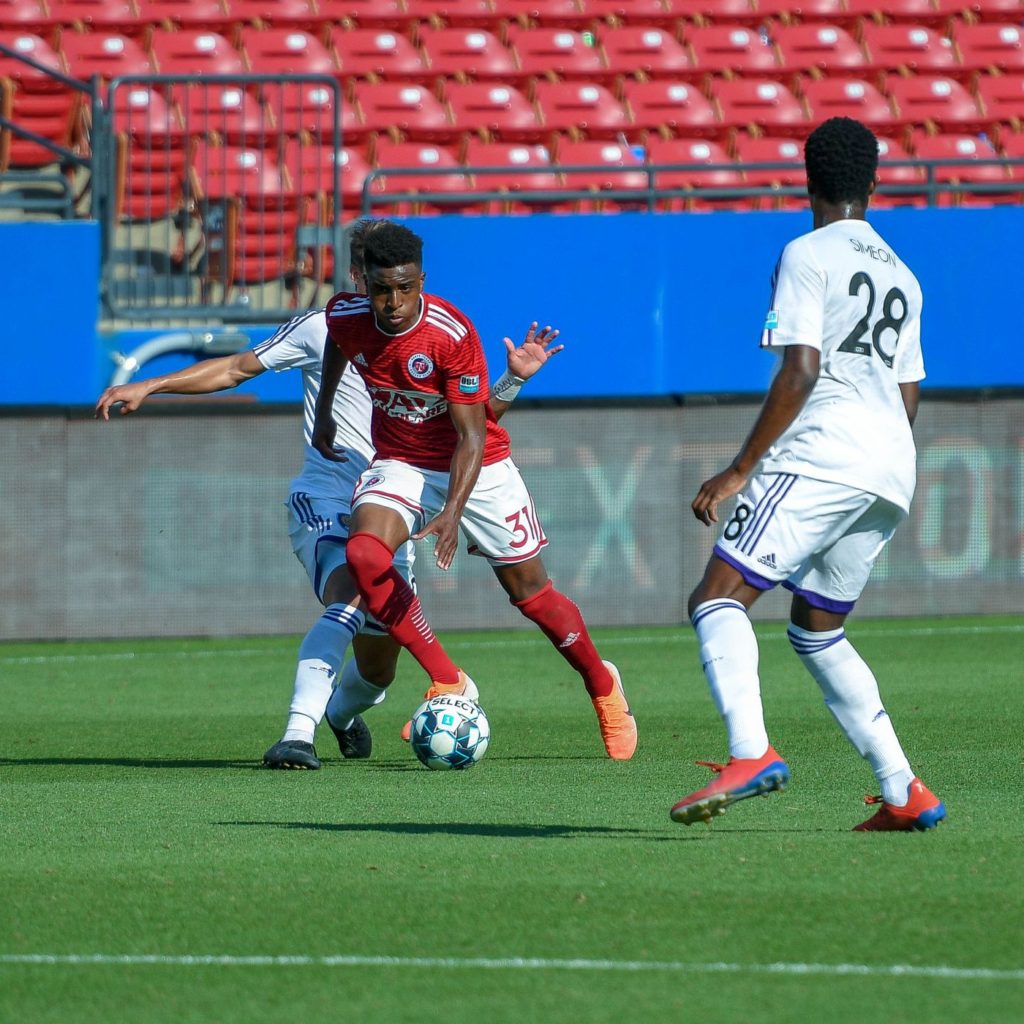
Toronto FC previously had a one-year partnership with the Wilmington Hammerheads of the USL in 2014.
For the 2018 season, TFC II moved its home games to BMO Field and Lamport Stadium. On July 2, 2018, the team announced they would move down from the United Soccer League to USL League One for the league’s first season in 2019. With their drop to Division 3, the team moved their home games to BMO Training Ground.
To learn more about Toronto FC II, please click here.
Toronto FC Recruitment Trials
At the time of this writing, there is no official publishing’s on Toronto FC trials. Please come back at a later date while we monitor this club or click here to visit their official academy news section.
CREATE A FREE RECRUITMENT PROFILE
Click the ‘LEARN MORE’ button below to take your career to the next level and create a fcscout.com recruitment portfolio to help clubs, coaches, agents, and scouts easily find you. For a limited time, we are offering this service for free!
Toronto FC Colors & Badge
Toronto FC’s colors are primarily red, black, and white. These colors are prominently featured in their team apparel, fan merchandise, and home stadium decor, creating a strong and identifiable brand for the club.
The badge of Toronto FC is distinctive and symbolic. The main element is a shield, which is a common motif in soccer badges, representing strength and unity. Inside the shield, there is a stylized maple leaf, which pays homage to Canada and acknowledges the club’s location and national pride. The maple leaf contains 11 points, representing the 11 players on the soccer field. Above the leaf, the team’s name “Toronto FC” is prominently displayed, making the badge easily recognizable. The badge’s color scheme mirrors the team’s colors, with red being the most dominant, accompanied by accents of black, white, and a touch of gray. This design encapsulates the club’s identity and its connections to the city of Toronto and Canada.
Toronto FC Kit
Toronto FC’s kit design typically reflects the team’s official colors: red, black, and white. Here is a general overview of their traditional kit elements:
Home Kit: The home kit for Toronto FC primarily features red, reflecting the team’s main color and earning them the nickname “The Reds.” This kit usually has a predominantly red jersey, often paired with red shorts and socks. The exact design can vary from season to season, with details and accents in black and white to complement the primary color. The home jersey often includes unique design elements or patterns, but red remains the dominant color.
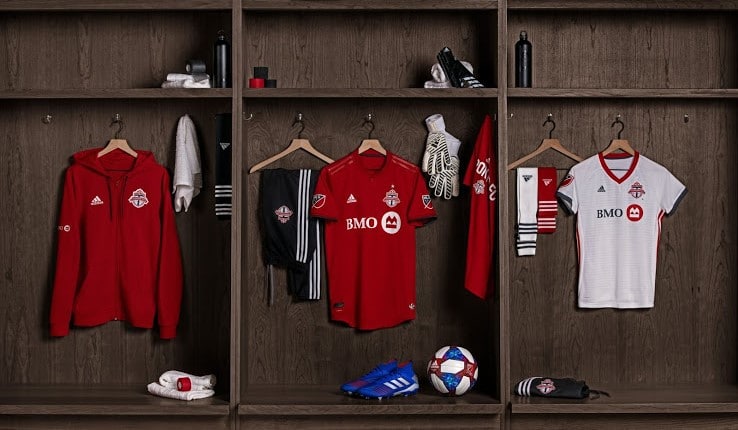
Away Kit: The away kit for Toronto FC contrasts with the home kit and typically utilizes the team’s secondary colors more extensively. Historically, the away kits have been primarily white or black, with red accents to maintain the team’s color identity. Like the home kit, the away versions can feature varying designs, patterns, and details from year to year, but they generally stick to the club’s color palette.
Alternate and Special Edition Kits: In addition to the standard home and away kits, Toronto FC occasionally releases alternate or special edition kits. These can vary in design and color but usually still incorporate elements of the team’s traditional color scheme. Special kits might be released for significant anniversaries, charitable causes, or cultural celebrations, and they often become collector’s items for fans.
The kits also feature the club’s badge prominently on the chest, along with the logo of the kit manufacturer and the team’s main sponsor. Over the years, the design specifics and sponsors may change, but the kits always aim to represent Toronto FC’s identity and heritage.
Toronto FC Stadium
Toronto FC plays its home matches at BMO Field, located at Exhibition Place in Toronto, Ontario, Canada. BMO Field is notable for its scenic location near the shores of Lake Ontario and its proximity to downtown Toronto, making it a central part of the city’s sports culture.
History and Development: BMO Field was officially opened in April 2007, originally constructed as a soccer-specific stadium primarily for Toronto FC’s use. Over the years, the stadium has undergone significant renovations and expansions to improve facilities and increase seating capacity. Initially seating around 20,000 spectators, its capacity has been expanded to accommodate over 30,000 fans, making it one of the larger stadiums in Major League Soccer.
Features and Facilities: The stadium is known for its intimate atmosphere, with stands that are close to the pitch, enhancing the experience for fans and creating a formidable home advantage. The design includes a continuous seating bowl, a canopy roof that covers most of the seating areas, and modern amenities for spectators, including diverse food and beverage options, merchandise stores, and fan zones.
BMO Field also incorporates features to enhance the player and fan experience, such as high-quality playing surfaces, including natural grass and hybrid systems to withstand various weather conditions and usage. Additionally, the stadium offers extensive locker room facilities, training facilities, and areas designated for media and broadcasting.
Multisport and Event Usage: While primarily the home of Toronto FC, BMO Field is a versatile venue that hosts a variety of other sporting events, including Canadian football, as it’s also the home of the Toronto Argonauts of the Canadian Football League (CFL). The stadium has been used for rugby matches, outdoor hockey games, concerts, and community events, showcasing its flexibility and importance as a multipurpose facility in Toronto.
Significance and Legacy: BMO Field has played a significant role in the growth and success of Toronto FC and has hosted numerous memorable matches, including MLS Cup finals and international fixtures. The stadium is regarded as a landmark in Canadian soccer, contributing to the sport’s development and popularity in the country. Its continuous upgrades and commitment to enhancing the fan experience reflect its status as a premier sports and entertainment destination in Toronto.
Toronto FC Club Culture
Toronto FC’s club culture is characterized by a passionate and dedicated fan base, diverse community involvement, and a commitment to success both on and off the field. Here’s a breakdown of key elements that define the culture of Toronto FC:
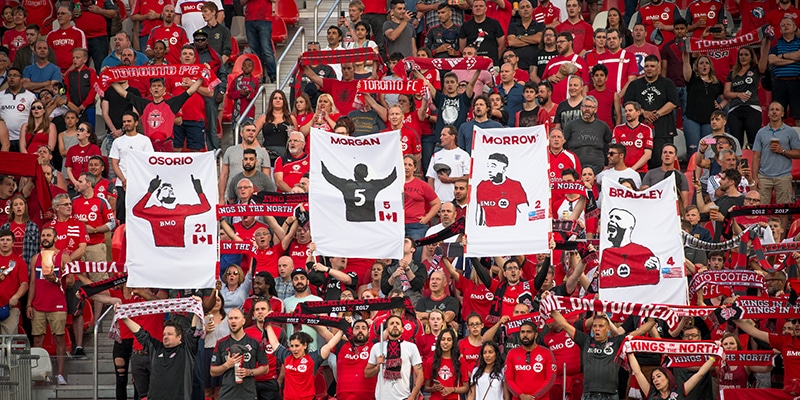
Passionate Supporters: Toronto FC is known for its vibrant and passionate supporters who have been integral to the club’s identity since its inception. The most notable supporter group is the “Red Patch Boys,” but there are several other groups and sections, such as the “U-Sector” and “Kings in the North,” contributing to a lively and supportive atmosphere at BMO Field. These groups create elaborate displays, chants, and songs, making home games an intense and engaging experience. The supporters are known for their loyalty and dedication, supporting the team through highs and lows.
Community Engagement: Toronto FC places a strong emphasis on community involvement and engagement. The club participates in various community programs, charity events, and youth initiatives, aiming to promote soccer and provide positive impacts throughout the Greater Toronto Area and beyond. They work closely with local clubs, schools, and organizations to grow the sport at the grassroots level and to give back to the community.
Inclusive Environment: The club promotes an inclusive and welcoming environment for all fans, regardless of their background. This inclusivity is evident in the diversity of the fan base and the club’s initiatives to celebrate different cultures and communities. Toronto FC’s efforts to foster an inclusive culture help unite fans and create a friendly atmosphere at their games and events.
Ambition and Professionalism: On the field, Toronto FC has shown a strong commitment to success, demonstrated by significant investments in players, coaching staff, and facilities. The club’s ambition to be a leading force in Major League Soccer is evident through its consistent efforts to improve and compete at the highest level. This professionalism extends off the field, with a well-run organization and commitment to providing fans with a quality experience.
Youth Development: Toronto FC has a strong focus on developing young talent through its academy system. The club invests in nurturing young players, providing them with the training and resources needed to succeed professionally. This commitment to youth development not only helps the club sustain long-term success but also contributes to the growth of soccer in Canada.
Traditions and Rituals: The club has established various traditions and rituals that enhance the matchday experience and strengthen the bond between the team and its supporters. This includes pre-match marches to the stadium, singing the national anthem, and specific chants and celebrations unique to Toronto FC. These traditions help build a sense of identity and community among fans.
Toronto FC’s club culture is a dynamic mix of passionate support, community involvement, inclusivity, and ambition. It reflects the diverse and vibrant nature of Toronto itself, making the club a significant and beloved part of the city’s sports landscape.
Toronto FC Home City
Toronto, the home city of Toronto FC, is the largest city in Canada and the capital of the province of Ontario. It is known for its diverse population, vibrant cultural life, and status as a major global city. Here are key aspects that define Toronto and its relevance to Toronto FC:
Cultural Diversity: Toronto is one of the most multicultural cities in the world, with over half of its residents born outside of Canada. This diversity is reflected in the city’s neighborhoods, festivals, food, and languages. The multicultural nature of Toronto contributes to the diverse fan base of Toronto FC, with fans from various backgrounds uniting to support the team.
Sports City: Toronto is a major sports city with a rich sporting history and a variety of professional sports teams, including the Toronto Maple Leafs (NHL), Toronto Raptors (NBA), Toronto Blue Jays (MLB), and the Toronto Argonauts (CFL). The success of these teams, particularly the Raptors’ NBA Championship in 2019, has contributed to a thriving sports culture in the city. Toronto FC has added to this landscape by bringing professional soccer to the forefront and cultivating a strong soccer community.
Economic and Financial Center: As Canada’s financial capital, Toronto is home to the Toronto Stock Exchange and the headquarters of many major Canadian and international corporations. This economic strength supports investments in sports, infrastructure, and cultural events, benefiting institutions like Toronto FC and the overall quality of life in the city.
Arts and Entertainment: Toronto is known for its vibrant arts scene, including music, theater, film, and visual arts. The city hosts several high-profile events such as the Toronto International Film Festival (TIFF) and Toronto Caribbean Carnival (Caribana), attracting artists and visitors from around the world. This cultural vibrancy enriches the life of the city and provides a dynamic backdrop for Toronto FC and its fans.
Educational and Research Hub: Toronto is a center for education and research, home to top universities like the University of Toronto and Ryerson University, as well as numerous colleges and research institutions. This academic presence contributes to the city’s innovative and progressive atmosphere.
Natural Beauty and Recreation: Despite its urban environment, Toronto offers a variety of green spaces, parks, and waterfront areas, including the Toronto Islands, High Park, and the Waterfront Trail. These spaces provide residents and visitors with opportunities for recreation and relaxation, contributing to the city’s quality of life.
Overall, Toronto’s diverse and dynamic nature makes it a fitting home for Toronto FC, reflecting the team’s values and contributing to its identity. The city’s support for sports, combined with its cultural richness and community spirit, provides a solid foundation for the club and its passionate fan base.
Explore More Clubs
CREATE A FREE RECRUITMENT PROFILE
Click the ‘LEARN MORE’ button below to take your career to the next level and create a fcscout.com recruitment portfolio to help clubs, coaches, agents, and scouts easily find you. For a limited time, we are offering this service for free!

